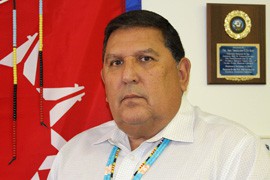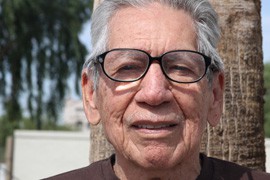Cronkite News has moved to a new home at cronkitenews.azpbs.org. Use this site to search archives from 2011 to May 2015. You can search the new site for current stories.
Thousands of Arizona veterans face backlog on disability claims with VA
PHOENIX – Peering through the new prescription glasses he just got from the veterans hospital, Korean War veteran Gilbert Torres sifted through a stack of papers detailing claims he’d had pending with the U.S. Department of Veterans Affairs since July 2011.
Torres is asking the VA re-evaluate the 30 percent disability he was awarded in the 1960s for injuries to both feet during a training exercise and to grant him disability for lingering gastrointestinal problems from food poisoning.
Torres said he’s happy with the services the VA has provided him over the years like free medical and vision care, but said he doesn’t understand why he’s been waiting more than a year for answers.
“I can wait, but I’d like to have some sort of notice,” he said. “I deserve what I’m asking for.”
Torres is part of a backlog of 17,000 disability compensation claims in Arizona as of October, according to the VA’s Phoenix Regional Office, which processes disability compensation for the state. These are claims that have been pending longer than 125 days.
There were 587,800 claims pending in the backlog nationwide as of September, according to the VA.
Despite efforts by the VA to ramp up processing times, officials say the department can’t keep up with the volume of claims, which have risen nearly 50 percent since 2008.
Part of the increase has to do with the conflicts in Iraq and Afghanistan winding down and many new veterans filing, but is also due to a class-action lawsuit that added ischemic heart disease, hairy cell and other forms of B-cell leukemia and Parkinson’s to a list of diseases associated with exposure to Agent Orange, according to John Rowan, national president of Vietnam Veterans of America.
“We’ve got a backlog because of a perfect storm,” Rowan said.
Beginning in 2010, the Phoenix Regional Office began processing disability claims related to that case almost exclusively, and between 2010 and 2011 the backlog in Arizona grew by 380 percent. Since then, the growth has slowed significantly, according to Monica Cabrera, a spokeswoman for the office.
In an email, Cabrera credited employees who have worked overtime, the VA’s hiring of 27 new veterans services representatives and a new VA process for streamlining claims-handling.
“While the Phoenix Regional Office is confident in the long-term benefits of these initiatives, the short-term implications (training of employees, decreased productivity while employees adapted to new environment) posed additional challenges to reducing the backlog,” the email said.
Joe Strickland, director of Arizona Department of Veterans Services, said that news doesn’t do much for those who are waiting.
“It makes me mad,” he said. “I see so many Iraq and Afghan vets who are struggling.”
Strickland said after the drawdown in Afghanistan by 2014, there will be hundreds of thousands of veterans coming back and looking for jobs, filing claims and struggling with all sorts of other issues.
“The federal VA is trying,” he said, “but I don’t think there’s a real solution until we get some distance between conflicts.”
One of the solutions being offered on the federal level is a new paperless disability claims system. This will significantly decrease the problems with paper-shuffling and lost documents, according to the Denny Boller, national service director for AmVets.
“They’re working on people, processes and technology,” he said. “What they’re going toward looks good.”
All 56 veterans regional offices will be under the new organizational model by the end of 2013, according to the VA.
Gilbert Torres said aging veterans may not be around long enough to benefit from such changes, though he added that he can wait.
“I feel that that our boys have got priority – the ones that are wounded, the ones that got legs missing, got arms missing. They should be first,” he said. “But at least let us know what you’re doing. I don’t know what they’re doing.”








